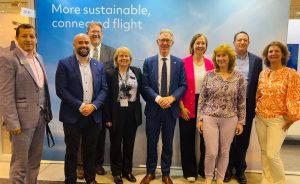The new master research agreement (MRA) will enable “bilateral collaboration across a range of sustainable aviation research opportunities, including advanced materials, hydrogen propulsion, advanced manufacturing and industrial design” says the university.
Both companies are subsidiaries of RTX Corporation.
TU Delft
“It gives us the opportunity to step up our collaboration on sustainable aviation with the engineering teams of Collins Aerospace and Pratt & Whitney,” said Professor Henri Werij, Dean of the faculty of Aerospace Engineering at TU Delft. “Collaboration with leading aerospace companies is absolutely crucial to take the necessary steps towards reaching the goal of climate-neutral aviation by 2050.”
Collins Aerospace and Pratt & Whitney will, under the agreement, initiate multiple research projects involving TU Delft graduate research facilities, students and staff over the next five years.
One of the first projects agreed as part of the MRA will see Collins and TU Delft collaborate on a high speed intelligent inspection system. This is to improve manufacturing processes for lightweight and recyclable aircraft materials.
Pratt & Whitney and TU Delft will also develop novel engine configurations. For example, ones that use thermal energy recovery technologies to improve fuel efficiency and reduce CO2 emissions for commercial aircraft.
RTX
“Collaboration between RTX engineers and university research institutions plays an important role in developing our understanding of emerging technologies, while also supporting the next generation of talent that will drive our industry forward,” said Michael Winter, RTX Chief Science Officer.
“Our MRA with TU Delft – our first agreement of its kind with a European university institution – will focus on advancing technologies to support more sustainable aviation, which is key to the future of our industry.”
The latest research agreement builds on long-standing co-operation between Collins, Pratt & Whitney and TU Delft. For example, through the European framework programme Clean Aviation, as part of the COCOLIH2T project for storing liquid hydrogen fuel on commercial aircraft.
Specifically, the companies sponsor TU Delft’s aerospace student association VSV Leonardo da Vinci and facilities. There are also internship opportunities at Collins Aerospace’s aircraft interiors development facility in Houten, Netherlands.
Image: RTX
See also: Qualinx raises $20m Series A

